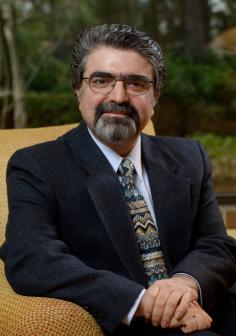Welcome to Computer Science and Engineering
The Department of Computer Science and Engineering (CSE) is now the largest academic unit in the College of Engineering and one of the largest at MSU. It’s because modern life is full of connected, computational devices, so CSE offers a tailored blend of fundamental learning, cutting-edge technologies and 20 laboratories with 21st-Century research strengths.
It helps our students obtain high-quality first jobs and build life-long careers in a rapidly changing world. CSE’s range of research includes artificial intelligence, biometrics, image processing, machine learning, software engineering and mobile computing. Additionally, we focus on distributed systems, computer networking, multimedia technologies, natural language processing, data mining and genetic algorithms. It’s an exciting time to be a computer scientist!

What an exciting time to be a computer scientist! Connected, computational devices permeate every aspect of modern life. Computational thinking and programming have joined mathematics, reading, and writing as essential skills for every student regardless of major. Right now, our department faces a myriad of opportunities and challenges. I am delighted to report that our faculty, staff, students, and alumni are embracing the opportunities and overcoming the challenges as they provide leadership and innovative solutions across all of our missions of education, research, and outreach.
In education, we are meeting the ever-increasing interest in computer science from majors as well as non-majors at both the undergraduate and graduate levels by strategically expanding our offerings including our new Bachelors of Science in Computational Data Science degree program. At more than 1,700 students as of Fall 2021, our programs are now the largest in the College of Engineering and one of the largest across MSU. We ensure a high-quality educational experience through a carefully tailored blend of fundamentals and cutting-edge technologies. Learning fundamental underlying principles helps our students build successful life-long careers in today’s rapidly changing world. Working with state-of-the-art technologies helps our students obtain high-quality first jobs. Our students and graduates are in high demand by local, state, national, and international companies as well as by elite graduate programs in top universities.
In research, we provide leadership in applying computational approaches to solve significant hardware, software, and data problems across a wide range of disciplines. You will find faculty working on artificial intelligence, machine learning, data science, big data, internet of things, digital organisms, telemedicine, and computational approaches to law enforcement, biometrics, and security. In addition to their individual research, many of our faculty participate in funded interdisciplinary projects with collaborators from both inside and outside MSU.
In outreach, our faculty and students participate in numerous programs and activities designed to attract and retain students from diverse backgrounds to ensure we build and maintain a more diverse and inclusive community. We also provide technical leadership to improve the academic systems developed and used across MSU.
We are particularly proud of our graduates. Our alumni are active near and far, developing innovative technologies and solving hard multidisciplinary problems. Please share your success stories with us, and we will highlight selected stories on our website.
It is indeed an exciting time to be a computer scientist. I am extremely honored and humbled to lead our department into the future as we continue to move forward to embrace new opportunities and overcome new challenges.
— Abdol-Hossein Esfahanian, Chairperson
Visit Undergraduate Admissions for information on applying to the program.
The Department of Computer Science and Engineering offers three Bachelors of Science degrees and one minor.
The Computer Science program prepares students for careers developing the computer software systems of tomorrow, from embedded systems in automobiles to desktop applications to mobile devices and the World Wide Web. The computer science program is accredited by the Computing Accreditation Commission of ABET.
The Computational Data Science program prepares students for careers applying and developing tools that support the data needs of tomorrow, from the intelligence in self-driving vehicles to business intelligence systems to opportunities not yet foreseen.
The Computer Engineering program is jointly administered with the Department of Electrical and Computer Engineering. Computer Engineering prepares students for careers developing both the hardware and software of computer systems, with an emphasis on the interaction of software and hardware. They can be computer architects, real-time system design engineers, applications engineers, data communications engineers, project engineers, production engineers, telecommunications engineers and solid-state engineers. The computer engineering program is accredited by the Engineering Accreditation Commission of ABET.
The academic minor in Computer Science provides a basic foundation in Computer Science. Those completing the minor will be able to apply computing skills in their respective discipline. The minor in Computer Science is available as an elective for those students enrolled in a bachelor's degree program at MSU other than the Bachelor of Science Degree in Computer Science or the Bachelor of Science Degree in Computer Engineering or the Bachelor of Science Degree in Computational Data Science, or the Bachelor of Science Degree in Data Science. The official requirements for the Computer Science Minor can be viewed in the MSU Academic Programs Catalog.
Visit Graduate Admissions for information on applying to the programs.
Today is an exciting time for Computer Science and Engineering! Advances in computing have transformed our world in the last several decades in ways that were once considered the substance of only dreams. Computing transcends boundaries—enabling multiple disciplines, connecting diverse peoples and cultures, and globalizing economies and work forces. At Michigan State University, Computer Science and Engineering has become a true microcosm of this important and exciting field.
Completion of a graduate degree in Computer Science and Engineering provides you with an opportunity to pursue career opportunities that would not otherwise be possible. Examples include cutting-edge research and development in business, industry, or a national laboratory, or a position in academia to engage in teaching and research. A graduate degree provides you with a deeper exposure to the field of computer science and engineering, and enhances your ability to pursue further independent study of new emerging areas of our discipline.
The Department of Computer Science and Engineering offers graduate study leading to the Doctor of Philosophy (Ph.D.) and Master of Science (M.S.) degrees. Advanced study and research are available in four general areas:
Software Systems
- Code generation
- Component-based software engineering
- Computer security
- Database systems
- Formal methods
- High assurance software
- Model-based development
Intelligent Systems
- Computational linguistics
- Computer vision
- Data mining
- Human computer interaction
- Humanoid robots
- Machine learning
- Natural language processing
Networking and Ubiquitous Computing
- Adaptive software/middleware
- Augmented and virtual reality
- Distributed systems
- Mobile computing
- Parallel and distributed processing
- Peer-to-peer systems
- Real-time systems
- Sensor networks
Biological Computing
- Artificial life
- Bioinformatics
- Biometrics
- Computational biology
- Evolutionary computing
Related Programs
The Computer Science and Engineering Department maintains state-of-the-art instructional and research facilities that are continually updated. Instructional facilities include high-speed servers and more than 100 workstations consisting of Linux computers and Microsoft Windows 7 computers. Facilities are connected to the high-speed campus network and are available for student use 24 hours a day, seven days a week.
In addition to computing support provided directly by the Computer Science and Engineering Department, the College of Engineering provides computing support via the Division of Engineering Computing Services (DECS). DECS maintains computer labs and other services for all Engineering students.
All MSU students also receive support from the MSU Computing Service Centers, which provide MSU email accounts, high-speed networking services, and numerous microcomputer labs on campus.

Social Media
Stay connected with your academic department and follow us on social media.
Mission
The Department of Computer Science and Engineering (CSE) at Michigan State University is a unit within the College of Engineering. Our mission:
- To impart the highest-quality instruction to our undergraduate and graduate students
- To conduct leading-edge research in computer science and engineering
- To provide leadership and service to our professional communities
We are committed to excel in all three components of this mission.
Instruction
The CSE Department has about 45 faculty members and each year awards approximately 400 B.S., 40 M.S., and 20 Ph.D. degrees in Computer Science. We administer an undergraduate Computer Engineering degree program jointly with the Department of Electrical and Computer Engineering.
The quality of our undergraduate and graduate programs is due to three major guiding principles:
Almost all of our courses are taught by full-time faculty members and reflect cutting-edge research developments. Small class sizes foster better communication between the students and the instructor. Our programs emphasize hands-on learning. Our instructional laboratory facilities undergo continual upgrades and replacements. Most courses include scheduled laboratory time with exclusive access to these facilities. Lab sessions have an instructor or teaching assistant present to provide support and answer questions. Our students are heavily recruited by Fortune 500 corporations, local and international companies, and other universities for graduate study and faculty positions.
Service
- Students, staff and faculty are engaged in professional and community service. Faculty serve on:
- MSU, College, and Department committees that help shape the University
- Editorial boards of top journals
- Accreditation boards and other bodies involving computer science education
- National and international conference committees
- Outreach projects involving local schools, businesses, and non-profit organizations
